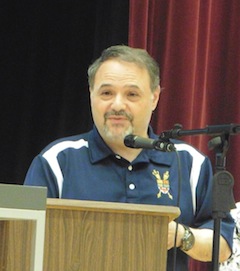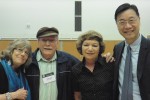Left to right: Gyda Chud (co-chair), Serge Haber, Jackie Weiler (co-chair) and Dr. Kendall Ho. (photo by Binny Goldman)
Jewish Seniors Alliance of Greater Vancouver’s annual spring forum – this year with the topic An App a Day Keeps the Doctor Away – drew a large and curious crowd to the Peretz Centre for Secular Jewish Culture on April 3.
JSA president Marilyn Berger welcomed attendees and thanked pianist Stan Shear for opening the forum. Shear would add the harmonica and his voice to his later performance, but first shared that his wife, Karon Shear, JSA coordinator, had suggested the opening song, “Accentuate the Positive, Eliminate the Negative,” by Johnny Mercer, as she thought it embodied the message JSA tries to instil in its approach to helping others.
Berger then surprised the audience by introducing Dan Ruimy, who is the Liberal member of Parliament for Pitt Meadows-Maple Ridge, where he owns and operates Bean Around Books and Tea.

Ruimy said that living in Maple Ridge doesn’t give him much opportunity to meet many Jews, so it was only on a recent trip to Israel as a parliamentarian that he rediscovered his Jewish roots. He said he was especially happy, honored and touched to talk to a group of his “compadres,” referring to those gathered at the forum. He said that seniors have given their life, blood sweat and tears to the building of Canada and he hopes to help the government become better equipped to meet the needs of seniors.
JSA is run by volunteers, said Berger – from peer support to education programming to advocacy – and its membership is diverse. As she called upon Larry Shapiro to introduce the forum’s keynote speaker, Dr. Kendall Ho, she noted that Shapiro had been volunteering with JSA since his arrival in Vancouver from Montreal. Smiling, Shapiro denied he had volunteered to be part of JSA, but rather had been shlepped in – and now would have to be hauled away from doing what he loves.
A practising emergency physician at Vancouver General Hospital, Ho is founding director of Digital Emergency Medicine within University of British Columbia’s department of emergency medicine. He praised the creativity of the day’s topic title – An App a Day Keeps the Doctor Away – which was penned by Berger. Ho said he was turning to mobile apps as a way of helping patients help themselves. There are many new ones in the market, he said, that can help people achieve better health and even strive for excellent health. Some of these apps are free.
Mobile technology can also supply life-saving information and provide immediate access to life-saving help. About the use of such technology by seniors, Ho gave some of the statistics from a recent study: 63% use wearable data for monitoring, 76% read online reviews to select a doctor, 74% book online appointments and pay bills, 73% of doctors use mobile devices to share information, 61% are interested in 3-D printing for prosthetic and hearing aids, and 57% use cutting-edge devices.
In choosing an app, Ho advised asking yourself the following questions: Is this a worthy tool and how effective is it? Is this technology good for me? Is it safe? Is my privacy/identity protected? Is it easy?
Ho demonstrated how easy it is to download a free app and encouraged the audience to download it as he went through the procedure step by step.
Of the available free apps, he recommended:
- Canadian Red Cross’ First Aid app, which helps users maintain their life-saving skills
- Medisafe Medication Reminder, available for a free trial period, which helps people manage the pills they have to take, including sending an alarm to their phone or watch as a reminder
- MindShift, which was developed in British Columbia to track the symptoms of anxiety and offers ways in which to cope with anxiety
- BellyBio Interactive Breathing, for relaxation
- Instant Heart Rate, monitors users’ heart rate
- Sleeptime, detects users motion while they’re sleeping, and can be programmed to allow you to complete your dream, as it can detect when you are in REM
- My Fitness Pal, a calorie counter and diet plan, and one of Ho’s personal favorites – it helped him lose 10 pounds.
Ho also suggested some important websites: healthlinkbc.ca to connect to a nurse or a health professional, myehealth.ca to get the results of a blood test (deleted after 30 days) and medlineplus.gov (research) for basic health information written in everyday language.
He advised the audience to ask their medical advisor which apps would work best for them, and to discuss results with the medical professional, so as not to cause themselves unnecessary anxiety by misinterpreting the data.
There are sensors available now, he said, such as wristbands, orthotics, helmets that detect concussions, a UV patch, a wand that monitors hydration (for cyclists) and T-shirts with sensors in the fabric.
Patient engagement, said Ho, is the blockbuster “drug” of the century. Using these types of technology, 88% of patients feel engaged in their health care. Using wearables shows a reduction of cardiac-related deaths and there is a 76% reduction in overall mortality when a patient is involved in his or her own health care.
Ho said that studies show that two out of three seniors 65 and over want to use technology to support their own health and access outcome-related data. Seniors now are tech savvy, he said.
Ho would like to see the use of health-related technology spread to the entire province; involve doctors, nurses, patients, governments and tech companies; be studied for its benefits, patient satisfaction and safety; and be further developed, with new sensors and devices over time.
The audience was reluctant to allow Ho to end his talk. Nonetheless, event co-chair Gyda Chud, who along with Jackie Weiler convened the forum, stepped in to ask if there were any questions for the doctor.
Ho was visibly moved when Al Stein said he would be forever grateful to Ho, as Ho had saved his life when he was having a cardiac problem and was admitted to emergency. Others who had been similarly helped thanked Ho fervently, as well.
Questions included whether there was an app for drug interaction and, yes, there is, but only for professionals. Attendees were also concerned that apps would reduce the amount of time doctors would spend with them. Ho said that apps were there to help both patients and doctors, but there was still the need for the right doctor to guide patients on their health journey.
It is safe to say that many in the audience felt that Ho would be the best guide and that the best mobile app would be Ho.
Chud thanked Ho, coining a slogan that Ho enjoyed: “Beat the stats, use more apps.”
Barbara Bronstein and Shapiro organized the refreshments, which Chud provided, and countless volunteers were everywhere from set-up to shalom. Karon Shear and Rita Propp also were integral to the whole event, while Stan Shear not only performed but, with son David, recorded the proceedings. The video can be found at jsalliance.org.
Binny Goldman is a member of the Jewish Seniors Alliance of Greater Vancouver board.

